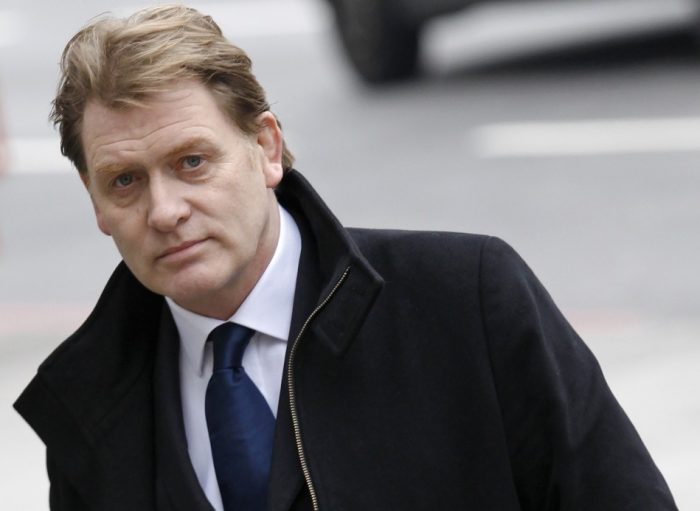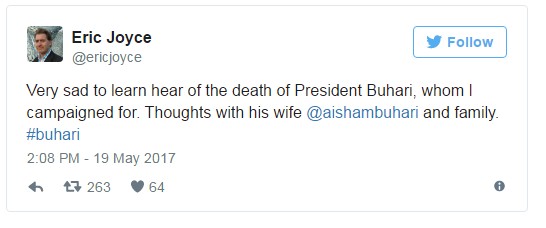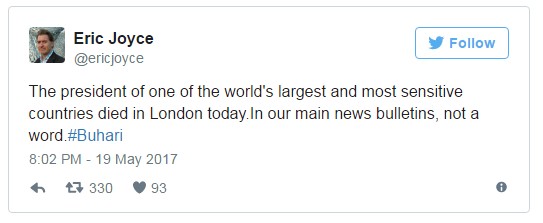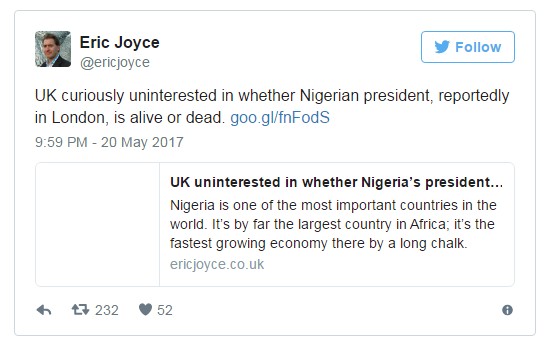
Death rumours trailing ailing Nigeria’s President Muhammadu Buhari continue to swirl on social media as the Nigerian presidency remains vague on the true health status of the country’s leader.
Eric Joyce, a politician in the United Kingdom and former soldier, has taken to a micro-blogging website to announce the death of President Buhari, who has not been seen in public since May 7, 2017 when he met with 82 recently freed Chibok schoolgirls. That evening, the presidency announced he was leaving Nigeria for London on an indefinite medical trip.
“Very sad to learn [hear] of the death of President Buhari, whom I campaigned for. Thoughts with his wife @aishambuhari and family,” the former member of the UK parliament wrote on Twitter on Friday, May 19, 2017.
“The president of one of the world’s largest and most sensitive countries died in London today,” the Scottish politician continued. “In our main news bulletins, not a word.”
His tweets were curiously ignored by the ever vocal All Progressives Congress supporters, just as the Nigerian presidency kept mute about the president’s condition.
Following responses from Nigerians and people around the world, Mr. Joyce penned an editorial on Saturday, published on his website, in which he called out Buhari’s handlers for a sloppy response to these death rumours and the Western media for ignoring the story.
“For two days, some sources have been reporting that President Buhari has died in a London hospital. Other sources, including the presidency, have been denying this, but not very convincingly,” he wrote.
“A general rule of thumb for any leader anywhere is that if people think you’re dead then you get yourself on the telly alive, immediately. So maybe there’s a bit of a temporary cover-up involved? And if there is, it’s hard to imagine the UK’s security service (‘Mi5) doesn’t know about it and have folk all over the place inside the hospital in question.
“The most striking thing in all of this is that the UK media doesn’t seem to give a toss either way – few outlets have published anything at all on the subject.
President Muhammadu Buhari
President Muhammadu Buhari welcomes at Aso Rock on his return to Nigeria on March 10, 2017 after returning from 50-day sick leave in London | State House Photo
“It’s Africa and not a famine; it’s Nigeria but not corruption, you see. No NGO comment or interest necessary.
“UK coverage of Africa is dominated by white journalists who pop from country to country and claim special knowledge. The news agencies are populated by young white journalists working in effect as stringers, often little more than kids taking a year out having a wee adventure. The NGOs who work mainly on Africa are so white it’s a disgrace. Perhaps if each employed a few more Africans we’d get some decent and serious coverage of that continent.
“For now, we can just wait and wonder on the fate of a president in London,” he wrote.
Following interest from many Nigerians, he penned another editorial on Sunday, May 21, 2017, titled, Nigeria: It’s For A President To Prove He’s Alive, Not His People To Prove He’s Not.
“First, if you’re a president then it’s up to you to show people you’re alive and well – it’s not up to your people to prove the opposite. Every politician in the world knows this,” Mr. Joyce wrote.
“A statement from a PR guy doesn’t cut it. Angry ripostes from supporters don’t cut it. Only your personal appearance cuts it.
“Second, if you’re a president and you’re not well, then a doctor needs to come out of the hospital and explain to your nation what’s up. This let’s everyone, including your people and the markets, know if your alive at all, alive enough to recover or have just sprained an ankle.
“Unless these things apply, then there will be shenanigans,” he maintained.
The Nigerian presidency has not responded to these new assertions.
See Tweets:










